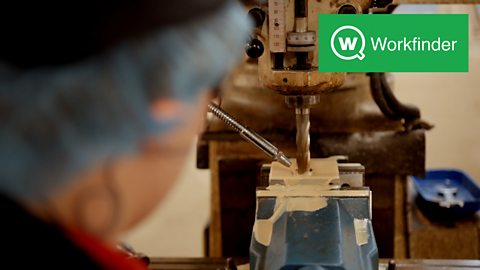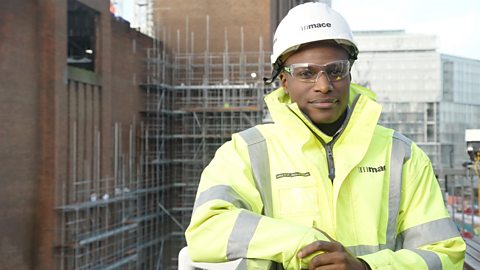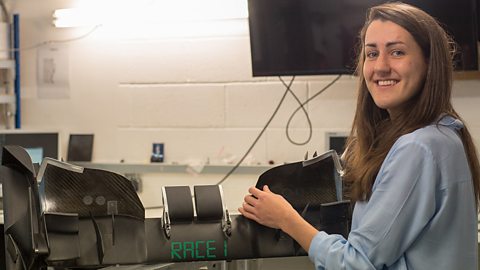Meet Jasmine, 20, from Crewe. Find out about life as an HS2 engineering apprentice at WSP. Part of our Bitesize world of work series.
Jasmine:
I'm Jasmine. I'm 20 years old and I'm an undergraduate engineer. I work for an engineering consultancy in the highways team. I'm on the HS2 project, which is the new High Speed Two rail network and I'm part of the drawings team where we create drawings for road safety audits, which are just to make sure that the roads are safe.
So at school I didn't know what I really wanted to do. I was very academic and at A-level I wasn't quite sure what I wanted to specialise in. My parents suggested, "Why not try Engineering? You know there's such a wide variety of sectors. You can go into." So I looked into it and I went to a college specifically for engineering and when I got there, I just I knew that that's what I wanted to do. I really loved it. My college was very engineering focused, so we were used to learning on the job, doing more hands on tasks and doing the theory in the classroom as well. So we could see how that linked together.
When I went to university, I found that it wasn't really like that and I found it quite difficult. So I decided to leave and pursue an apprenticeship. I looked online at different degree apprenticeships that I could take and I found this one. I was luckily awarded this job.
Jasmine's boss:
Jasmine has brought a vitality, not only to the company but also to our local team. There are so many fantastic construction projects in the pipeline. We really need to make sure we've got to the next generation of engineers coming through to the industry. With the programme that Jasmine's on, we get the opportunity to see exactly what she can do and can give her that knowledge and experience that will be so vital to her in her future career, and also for her future studies.
Jasmine:
I thought that there's a stigma attached to what people think that engineers should look like and it's very important you know, as a young black woman, to have other black, Asian, and minority ethnicities join the engineering field. We need to gather all the different mindsets to be able to solve the world's upcoming problems. Don't worry if you're not the top student at maths, you're not the top student at science, because it doesn't matter. It's all about creativity and thinking differently having a different mindset to others. There's lots of people to help and to bounce ideas from and that's what's good about it.
It's very important as a young black woman to have other BAME people join the engineering field. We need to gather different mindsets to solve the world's upcoming problems.
- Jasmine believes that gaining practical experience is the best way to figure out which field of work is best for you
- In her apprenticeship, she's currently working on the HS2 project which is focused on creating a new high-speed train route into London
- Jasmine uses Maths to collect and analyse data on traffic and road systems and she uses English to write up her findings, which have to be clear and accurate.

What to expect if you want to be an engineer
- How many people work in the engineering sector?
- What can you earn in different roles?
- What routes can you take to get in?
- Is the demand for engineers expected to grow in the future?
Watch the film to find out the answers to these questions, and much more!
Other resources
- See what type of engineering role might suit you with the meet the future you quiz
- Find out more about the different areas of engineering with this guide from Tomorrow's Engineers
- Learn more about roles in engineering with the National Careers Service explore careers tool
- Discover a practical new way to study via T-levels (England-only).
Emma-Louise Have you ever had an idea for an invention, something you thought would make your life easier? If so, you've taken your first steps into engineering something.
Frankie As an engineer, you apply scientific principles to design and help create all sorts of things like buildings, aircrafts, or bras.
Emma-Louise Traditionally, engineering falls in four main categories: chemical, civil, electrical, and mechanical engineering. And, within each of these, there are more specific types of engineering disciplines.
Frankie There were nearly 870,000 engineers in the UK [in 2020], with an estimated 4% growth of just under 40,000 more jobs by 2025.
Emma-Louise You could consider roles such as electrical engineer, chemical engineer, mechanical engineer, nuclear engineer, or software engineer. For electrical engineers,
Frankie people who design, build and maintain electrical systems and equipment,
Emma-Louise there is an expected job growth of just under 1,600 jobs by 2025. As of 2020, the median salary was just over £50,000 per year.
Frankie For civil engineers,
Emma-Louise people who design and manage construction projects, anything from bridges to sports stadiums,
Frankie there's an expected growth of approximately 2,800 jobs by 2025, with a median salary of around £44,500.
Emma-Louise And for mechanical engineers,
Frankie people who develop and design machines that are used in various industries from construction to farming,
Emma-Louise there's an expected growth of just under 2,600 jobs by 2025, with a salary of around £42,000. If you've got a curious mind and love problem solving, engineering could be a good career path for you.
Frankie There are many ways into engineering. The first thing to figure out might be what kind of engineering you're interested in.
Emma-Louise You could consider apprenticeships that are relevant to that role, like a Level 6 Manufacturing Engineer or a Level 6 Electro-mechanical Engineer apprenticeship. These typically take between four and six years to complete.
Frankie Of course, there are also many university courses you could look into. Courses such as Electro-mechanical Engineering, Applied Physics, or Aeronautical Engineering. You would usually need two or three A-levels or equivalent for these, and some of these courses will specify if you need particular A-levels, or the equivalent. Maths and Science subjects are sometimes required.
Emma-Louise There's now more choice as the new T-level qualification is available in England. These two-year courses are equivalent to three A-levels and involve 80% classroom learning and 20% industry placement.
Frankie You can also find out about courses accredited by professional engineering institutions from the Engineering Council.
Emma-Louise Engineers have valuable transferable skills that are handy for other job roles and everyday life, such as problem solving, critical thinking, and working through potential solutions.
Frankie If you've heard things in the past that have made you think engineering is not for you, it might be worth taking a deeper look. Engineers are working on some of the most exciting challenges we face, be it enhancing virtual reality or engineering better medicines. Let's hear from some professionals. Ben is an aerospace engineer. "I love interacting and working with people to find solutions to problems. I enjoy knowing that millions of people fly around the world every year on products that I have helped develop. There's a big push at the moment for more environmentally friendly solutions. Air travel is a massive contributor to global warming and so anything that the industry can do to reduce harmful gases being emitted will make a big impact."
Emma-LouiseDavid, an expert at the Institution of Engineering and Technology, says: "The most exciting thing about engineering and technology is that there will be roles in the next five to 10 years that don't exist yet. Artificial intelligence (AI), coding and ‘green jobs’ – those that work to combat climate change – will continue to evolve and be some of the most important roles within the sector in years to come. It's also really important that the engineering industry is inclusive and representative as engineers, design products and services for everyone."
Emma-Louise Engineering is creative, exciting and not to mention that it pays pretty well once you've worked your way up beyond junior roles. The median wage within the sector is over £41,000, compared to the median full-time salary in the UK which is around £28,500.
Frankie There's also particularly strong growth in software publishing and wireless communications.
Emma-Louise Engineering is also an industry where the gender mix isn't well balanced, although the research is unclear as to why.
Frankie The main shortfall here is engineers who identify as female. As of 2020, 88% of engineers identified as male. However, lots of employers are keen to change this, so there should be more and more opportunities coming up for engineers who identify as female.
Emma-Louise One thing that's for sure is that there are going to be lots of opportunities available in the engineering sector, with just under 40,000 new jobs expected by 2025. So, if this has piqued your interest, then it'll be worth doing some more research to see if this is right for you.
For careers advice in all parts of the UK visit: National Careers Service (England), nidirect (Northern Ireland), My World of Work (Scotland) and Careers Wales (Wales).


Work experience in your area
Find work experience placements with Workfinder.
Tips and advice
Help with interviews, writing a CV and all things work experience related.


How to become an engineer. collection
Find out more about the engineering sector and how those currently working in it got their foot in the door.

Careers in construction. collection
Find out what you could expect from a role in the construction sector.

Amy: Formula 1 engineer
Amy helps develop ways to make racing cars go faster.
